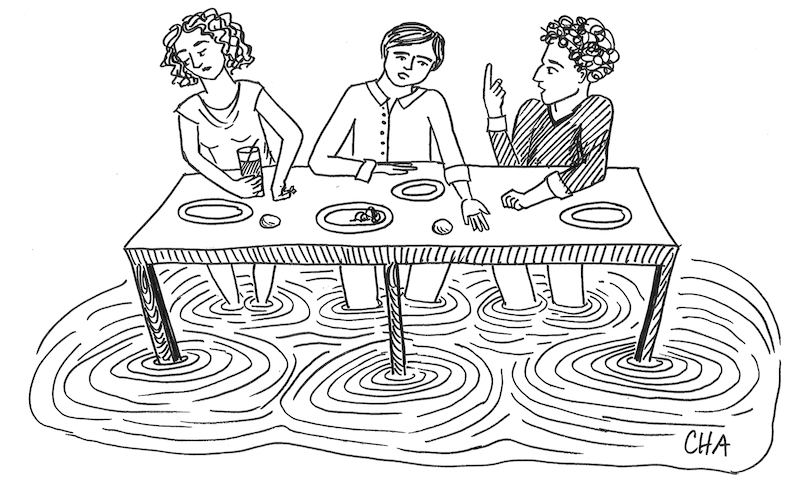One spring night a few weeks ago I was eating dinner with friends and we were talking about climate change. It was a “Latin American inspired” place on Dekalb Avenue in Brooklyn, and we were sitting in window seats next to the front door which kept blowing open and shut—it had been a cold winter, though it was starting to get warm again. We had all ordered meat dishes and someone said that probably we should be trying to be vegetarian. Why, one friend said? Because of climate change man, said the other. We were tired, and a little melancholy. It was Saturday but not quite nighttime. It was already dark. We ordered diet Cokes instead of wine or beer.
No climate deniers at our table. It’s terrifying, our friend Graham said. I mean, no one even talks about it. It’s like we keep on doing our own thing. A few days before, the IPCC had come out with their newest Assessment Report, a nicely harrowing one that let the New York Times put climate science and rising sea-tides on the front page of the newspaper for about a week. One Working Group (WGI) had in front of them the question of the existence of climate change—sentences followed with descriptors like high confidence, medium confidence, very high confidence, in italics, that sort of thing. But the newsworthy reports were about adaptation and mitigation; how society must change to survive, to keep CO2 levels under the specific number argued over and arrived at (high confidence, very high confidence) in the earlier ARs. This was Working Group Two and Three, mind you (WGII and WGIII). Trajectories are scary things.
It’s a collective action problem, I said, which was a pretty hopeless thing to say. What good does it do to say that, I thought to myself? Nobody had disagreed with me. What good’s talking about all this, even. There’s so many other problems in the world. I settled even further into my diet Coke. It’s fucked up, one of us said. Outside, the wind continued.

Then Graham, who was the hero of this conversation, rose out of his/our Saturday stupor, and you could tell a big thing was coming from the way his hands fought for purchase in the air, the way he foregrounded his chest. I mean, he said, his eyes lighting up, I feel like what we need is a new way of talking about it. I feel like we should be talking about it, all of us.
He didn’t stand up or raise his diet Coke glass or anything but it felt like some kind of creed.
Look, the science is great, that’s the most important part, he said. But everyone should be talking about it too. People from all different angles. It’s too serious not to. There should be a book of interviews with just the absolute best people in all different fields, about what they think about climate change, what they know, how we can make it better.
It felt like something we could get excited about.
Like the moon launch, Charlotte said. NASA, some government organization.
A historian, I added, someone to talk about the history of activist movements, how they become successful, or not.
Farmers probably.
Architects.
Definitely engineers!
A sculptor. Or one of those land artists! Absolutely a land artist. I wonder what they’d think.
Politicians (I suppose). Musicians. People who do pure math.
It’s just, there has to be something we can do, or they can do, Graham said, slowing down. All of us, he meant. It’s too terrifying, he concluded, to think of the alternative.
Naturally we began to think of the alternative.
What was the alternative? Death, basically, although that’s hardly a choosable option as opposed to an end state. Too big to think about, certainly at a restaurant, with warm friendly lights and a window seat. Rising oceans. Flooded cities. Not enough food for subsistence, forget about restaurants. Trying to build some machine in an underground laboratory to get the poison out of the air. We’d been a fortunate generation here in America, what would resource warfare look like? Forget about culture. Or interview books.
Our food came, our meat, lying sizzling on large plates in front of us. We’d already been brought back down to our pre-caffeine levels. Our heads dropped to stare at our waiting meal accordingly. We were quiet a while and we traded plates, and ate without talking.
Outside, the water didn’t rise. New York City stayed like it usually was. One could imagine Dekalb Avenue being a funnel, some kind of water channel, if the East River flooded onto Flatbush, but lots of other things would change before that. It was pleasantly warm out, just the way we liked it, perfect for human habitation. Perfect for mirth. A little warmer wouldn’t be the worst thing in the world, not right now, not right away.
